Soft Rain
Fourth Grade (on grade level)
Section 1 (pages 1-23)
Summary
Soft Rain is a young member of the Tsalagi (Cherokee)
Indian tribe. She lives a happy life in North Carolina, with her
younger brother, Hawk Boy, Grandmother, Father, and Mother. She attends
the Tsalagi school where they learn to speak and read the white manís words.
Soft Rain is an excellent student and is quite proficient in the white
manís language. Her world begins tumbling down around her when her
teacher reads a letter from the Superintendent of Cherokee Removal, which
states that they must, ďremove to the lands set apart for them in the West,Ē
(page 5). Her teacher leaves before they are forced to move, so the
school is closed. Soft Rain is determined to continue reading and
decides to teach Hawk Boy and her cousin, Green Fern, as she learns new
words.
Soft Rain fears that they will have to leave their
home because of the Superintendentís letter. Her father assures her
that they will not leave, as they have too much to do already in cultivating
their land for planting. Soft Rain begins to help with the planting
and anxiously awaits the Green Corn Festival.
After a long morning of working on the land, Soft
Rain and Mother return home only to be forced from their home by Big Boots
and other soldiers. Grandmother, Father, and Hawk Boy are left behind.
They join many others and walk for days, until they reach the Stockade.
Here they are kept in pens like animals. Many people die, including
Green Fern. Soon they are traveling again. Their shoes and
bodies wear thin as they continue the journey West. They cross many
mountains and rivers and endure cold, wet nights. Along the way,
they meet a young chief who tells them that the Indians are now in charge.
Soft Rain constantly searches for Father and Hawk
Boy. They are finally reunited towards the end of their journey.
Father has become a leader. He hunts for the people and helps care
for them. Soft Rain and Hawk Boy receive help from two young white
children. They give them food and clothes that they have out grown.
This helps them survive the harsh conditions they must endure. Soft
Rain falls ill towards the end of the journey. She awakes to find
that her Uncle Swimming Bear has joined them. The two families make
plans to build their homes near each other when they reach their new home.
Discussion Director
The discussion directorís job is to develop questions for the group
members to discuss about this section of the book. The focus is on
important ideas and issues in this section and designing questions that
address them.
1 Cause and Effect
1 Point of View
2 MCEOG
1 Opinion
Cause and Effect
1. Name two events that happen in this section (effect), and then discuss
why (cause) each one happens.
(1. Soft Rain and the other Tsalagi children are not able to
go to the school anymore (effect). The Superintendent of Cherokee
Removal sent a letter to the teacher, which said, "The Cherokees
must. . . remove to the land set apart for them in the west." The
teacher decides to move away before they would be forced to leave, so she
would no longer be able to teach them at school (cause). (page 5)
2. Green Fern would not be able to meet with Soft Rain anymore
to read and write words and hear stories (effect). Green Fern's parents,
Aunt Kee and Uncle Swimming Bear, did not want Green Fern to learn the
white man's language and alphabet or go to school (cause). (page
16))
Point of View
2. From whose point of view is this story told?
A. Soft Rain's
B. Hawk Boy's
C. Old Roving Man
D. Grandmother
(A. Soft Rain's)
Opinion
3. Do you think Soft Rain and her people will have to move West?
Why?
(Yes. The book is about the Trail of Tears, the Cherokee's long
and harsh Westward journey, that the Cherokee's were forced, by soldiers,
to embark upon. So, they must have to move eventually.)
MCEOG
4. All of the following describe Hawk Boy except for which one?
A. anxious to learn to read
B. willing to help father
C. playful
D. unkind
(D. unkind)
MCEOG
5. According to this section, which is the biggest potential
problem for Soft Rain and her family?
A. The teacher is leaving and there
will be no more school.
B. They may be forced to move West.
C. Getting the fields plowed and the
selu planted
D. Grandmother's blindness
(B. They may be forced to move West)
Passage Picker
The Passage Picker's job is to select significant passages from the
selections being read; determine why those passages are important; call
other group member's attention to the passage; and lead a discussion about
the passage.
Steps:
1. Pick
out a passage you would like to share.
2. Write
down the page and paragraph number.
3. Write
down the first two words and the last two words of your passage.
4. Write
down the reason you chose the passage, and explain why!
5. Ask
a question about your passage, and give an answer.
6. Write
down the Authorís Purpose: To Describe, To Entertain, To Inform,
or To Persuade.
1. Passage One- Informative
2. Page 5, paragraph 2
3. "It is . . . the West."
4. This passage is informative. It introduces the main
problem that the Tsalagi People will face. The passage is interesting
as it is presented in the form of a letter. It foreshadows what will
eventually happen in the story.
5. What state do Soft Rain and her people live in?
(North Carolina)
6. Author's Purpose: To inform
1. Passage Two- Descriptive
2. Page 9, paragraph 1
3. "Her mother. . . is safe."
4. This passage presents a contradiction. Mother suggests
that people being forced to move from Georgia should go to North Carolina,
a safe place. This statement contradicts what the letter says.
5. Who does Mother refer to as Real People?
(She means the native people who first settled and
lived on the land. The people who were the real owners of the land.)
6. Author's Purpose: To describe
1. Passage Three-Descriptive
2. Page 10, paragraph 7
3. "Soft Rain. . . she promised."
4. I chose this passage because it describes the close relationship
Soft Rain has with her Grandmother. It reminds me of the way my family
can tell that there is something bothering me, even though I do not say
anything about it.
5. If Grandmother is blind, how does she "see" that Soft Rain
is crying?
(When people lose one of their senses, the other senses are heightened.
Grandmother knows Soft Rain very well. She may have been able to
hear the sadness in her voice or a little sniffle.)
6. Author's Purpose: To describe
1. Passage Four- Entertaining
2. Page 23, paragraph 3
3. "Soft Rain. . . the hole.
4. This passage is humorous and has just enough imagery to help
me visualize Hawk Boy dropping the kernels in the holes without bending
over.
5. Why would Hawk Boy try to drop the kernels in the holes without
bending over?
(The job of planting seeds is very mindless, repetitive, and monotonous.
Hawk Boy was just trying to make it a little more fun and challenging.)
6. Author's Purpose: To entertain
Word Wizard
The Word Wizard's job is to search the section being read for words
that are key to understanding what is happening in the story; note the
page and sentence where it can be found; check the dictionary meaning of
the word; lead a discussion about the meaning and intent of the word from
context and what the word contributes to the importance of the passage.
Steps:
1. Write down the word.
2. Copy the sentence from the book in which
the word appears.
3. Look up the word in the dictionary.
4. Using the context clues from the sentence
and the dictionary definition, write in your own words the
definition of the word.
5. Write the correct part of speech (noun,
verb, adjective, or adverb).
6. Write a question and the answer about the
word that would help you teach the word to your group,
refer back to the text,
or write a sentence using the Word Wizard word.
7. Make your Word Wizard card. Be sure
to include in big print, your word and the page and paragraph
number. On the other
side of the card should be a picture, the word, and the definition of the
word.
1. Cultivating, Page 18, paragraph 1
2. "We're busy cultivating our land."
3-4. cultivating- getting the land ready to grow crops by plowing
soil, planting seeds, pulling weeds and other necessary care
5. verb
6. Soft Rain and her family were cultivating the land for what
kind of crop?
(Selu-corn, and beans)
7.
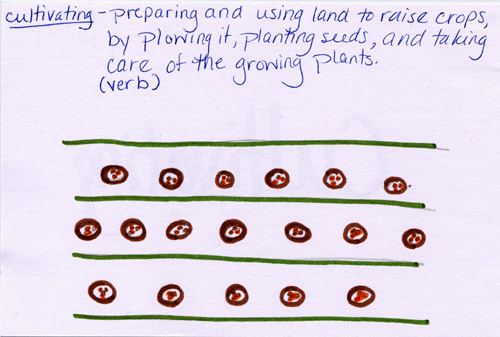
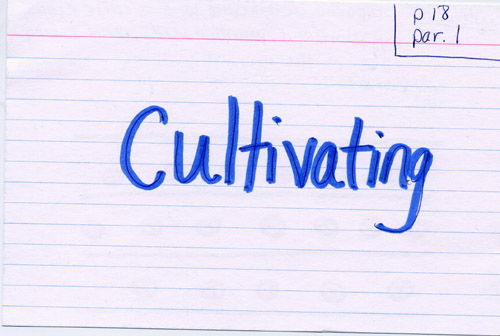
1. Chided, Page 1, paragraph 2
2. "There is no time for your story this morning," Mother chided.
3-4. chided- to reproach or blame
5. verb
6. The teacher chided the student for not doing her homework.
7.
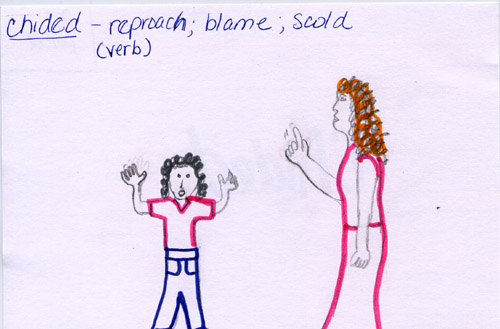
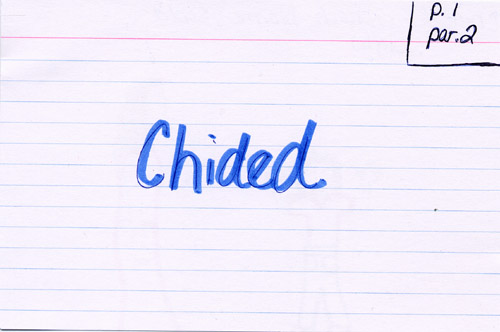
1. Stammered, Page 4, paragraph 4
2. "Your reading is excellent. . . as usual," the teacher stammered.
3-4. stammer-to stutter or try to speak
5. verb, noun
6. What caused the teacher to stammer when she complimented Little
John and Soft Rain's reading?
(She had a hard time speaking because she was crying. She was
very upset about the letter and having to move away.)
7.
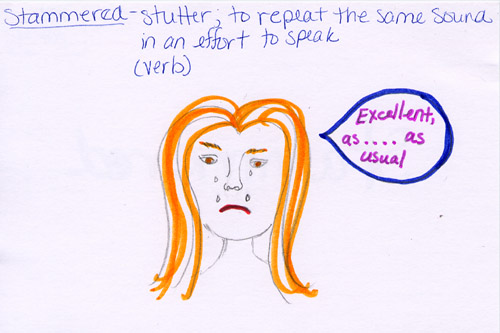
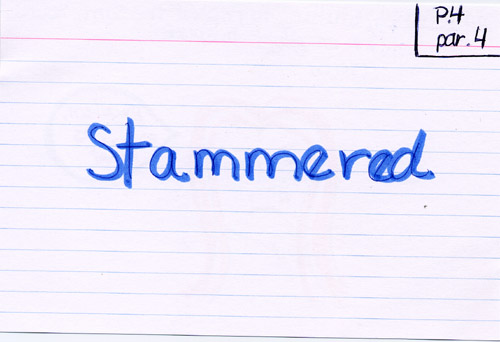
1. Waded, Page 20, paragraph 4
2. Soft Rain waded in cautiously.
3-4. waded- to slowly and carefully walk in water or snow or
mud; to get through something with difficulty
5. verb
6. Amy slowly waded into the water because it was murky and she
could not see the bottom of the lake.
7.
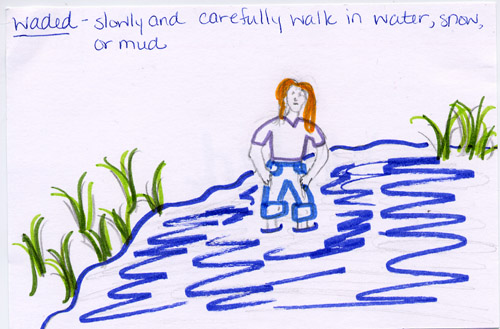
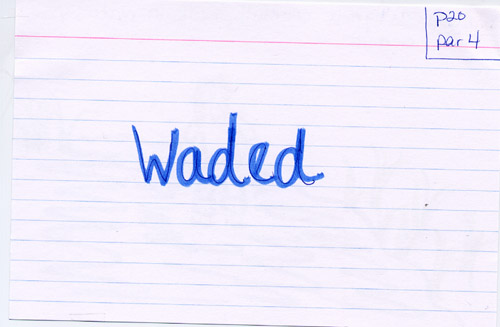
Character Sketcher
The Character Sketcher's job is to develop a character map of major
characters in the section of text being read.
Steps:
1. Pick out a character that interests you. Choose three
words to describe this character.
2. For each trait, you will give proof (an example) from the
book (write down page and paragraph).
3. Write out the character's goal, problem, and solution (page
and paragraph).
4. Last, you will draw a picture of your character.
Soft Rain
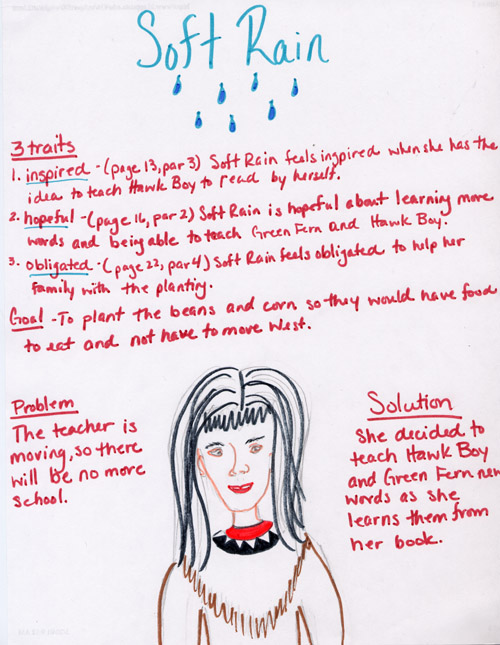
Investigator
The Investigator's job is to examine other sources (newspaper, web,
encyclopedia, content texts, etc.) that have connections to the book being
read and share that information with the group.
Who is Sequoyah?
Sequoyah (1770-1843?) was a leader of the Native American people.
He is known for his creation of the Cherokee alphabet, which he developed
to preserve the Cherokee culture. He began the writing system in
1809 and completed the 80 character alphabet in 1821. The alphabet
represented all of the syllables in the Cherokee language. This provided
a way for the Cherokee people to write true and factual accounts of their
lives.
Sequoyah's name can be spelled Sequoya, Sikwayi, or Sequoia.
His English name is George Guess. He is thought to be the son of
an English trader, and a part-Cherokee woman. He was born in Tennessee,
and then he lived in Cherokee County, Georgia. Here he was a trader
and silversmith. He was also a soldier in the United States Army
during the Creek War between the years 1813-1814.
California named the Sequoia tree and the Sequoia National Park after
him.
"Sequoya." Microsoft Encarta Online Encyclopedia 2000. <http://encarta.msn.com>
Microsoft Corporation, 1997-2000.








